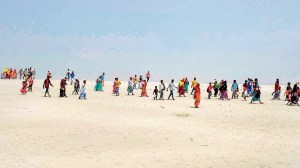- India
- International
One year of Narendra Modi-led government: Ministry Meter
This is a series on the key events in various ministries during the first year of the Narendra Modi government.
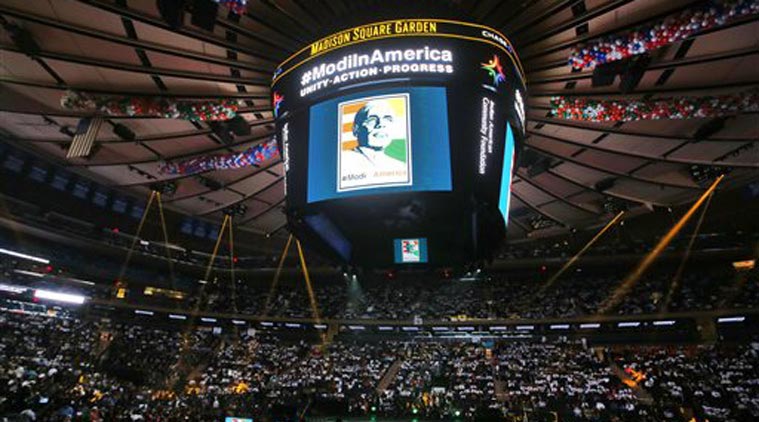 September 28, 2014. Narendra Modi at Madison Square Garden during his visit to the United States.
September 28, 2014. Narendra Modi at Madison Square Garden during his visit to the United States.
By: Maneesh Chhibber, Shubhajit Roy, Pradeep Kaushal, Pranav Kulkarni, Avishek G Dastidar, Vijaita Singh and Manoj C G
In the concluding part of this series, The Indian Express looks at the key events in six more ministries during the first year of the Narendra Modi government, what the ministries promised and what they actually delivered, how they rate their performances — and what their rivals think.
 External Affairs- Engagement with leaders, visibility
External Affairs- Engagement with leaders, visibility
Promises
The government signalled its intent to about engage with SAARC countries when Narendra Modi invited all SAARC leaders to his swearing-in. It engaged with major powers, including the US and China, and got major countries and companies to announce investments in India.
Pluses
The government took a leadership role in SAARC, and showed it during the Nepal earthquake. It broke the deadlock on the Indo-US nuclear deal. The foreign secretary’s SAARC Yatra gave a reason to connect with Pakistan, after foreign secretary-level talks has been cancelled. The Land Boundary Agreement with Bangladesh has been passed. The process for purchasing Rafale jets, which was locked in negotiations, was restarted. The government showcased Make in India across the world. It convinced China to open the alternate route of the Mansarovar Yatra through Nathu La, got the international community at G-20 to act against black money, and evacuated Indians from Yemen, Nepal, Iraq, Ukraine and Libya.
Minuses
The policy towards Pakistan remains unclear. Although the knot on nuclear liability has untied, private companies are yet to come on board fully. The PM’s attempt to get the Chinese leadership to commit to clarification on the Line of Actual Control has not yielded that result.

Self-rating
“It’s been an interesting year for MEA. The increased emphasis on our immediate neighbourhood was long overdue. Most importantly, I think the one message that has gone out to our own people is that Indian lives, wherever they may be, are of paramount importance. I also like to believe our missions and embassies across the globe are far more accessible to our own people than what they were before. We live in a changing world where the challenges are endless. MEA is the face of this new India for the rest of the world. We have excellent people fully committed to looking after our interests in every corner of the world. The message to all Indians should be loud and clear – we are always there to look after their interests. The foreign policy has been tweaked to further the interests of India.”
* V K Singh, MoS, external affairs
Opposition rating
“No other Prime Minister has travelled so much. And what is the net result? Nil. Whichever countries he has visited, they have become more hostile. He wanted to cultivate Pakistan; what is the result? He visited the US and Barack Obama visited India, but no goodwill was created. Remember what Obama said before he left the Indian soil. Similarly, no substantial investment has come from the US. The Chinese President visited India, after which Beijing committed billions and billions of dollars to Pakistan. Ultimately if you look at all his 17 or 18 foreign visits and his government’s engagement… it has only worsened with some countries. Afghanistan has been a friend; China has already snatched it away. His personal prestige may have been enhanced, but the government’s conduct of foreign policy has not enhanced the nation’s prestige.”
* M Veerappa Moily, head, Congress shadow group on External Affairs
 Law & justice- New way to appoint top judges, end of many laws
Law & justice- New way to appoint top judges, end of many laws
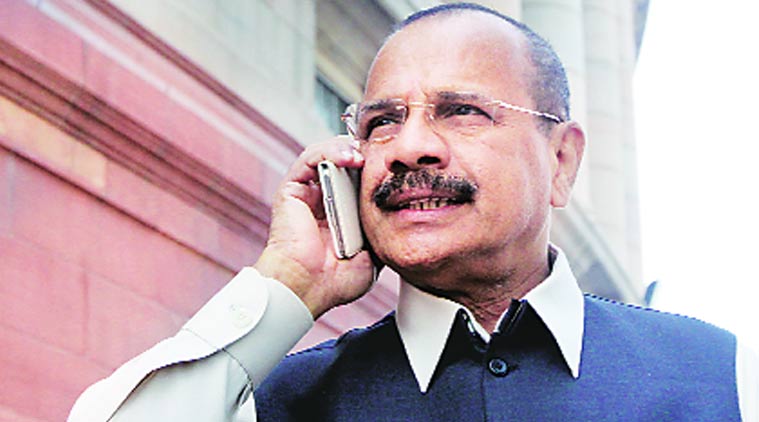 Gowda in Parliament.
Gowda in Parliament.
Promises
Legal reforms, especially for replacing the collegium system of appointments to the higher judiciary with a more transparent system, were a priority. The government has an ambitious plan to abolish one outdated law per day, and to introduce a new litigation policy to prevent intra-government litigation. Law has had two ministers in the first year, Ravi Shankar Prasad followed by D V Sadananda Gowda.
Pluses
The National Judicial Appointments Commission Bill along with the mandatory Constitution Amendment Bill was passed, replacing the collegium system. The NJAC comprising the Chief Justice of India, his two most senior brother judges in the Supreme Court, two eminent jurists (to be selected by a committee headed by the PM) and the law minister is responsible for appointments and transfers in the higher judiciary. The constitutionality of the NJAC is pending before a five-judge bench in the Supreme Court; the government has told the court that there is no way the collegium system can be revived.
National Litigation Policy prepared to prevent litigation among government departments. After receiving reports from the Law Commission and a committee of experts, Gowda has tabled four Bills to repeal outdated laws. Another Bill, aimed at regulating and speeding up commercial arbitration, is ready for the next session of Parliament.
Minuses
Many legal experts say the NJAC could be part of the government’s plan to have a pliant judiciary. While in opposition, the BJP had promised to involve the common man in pre-legislative processes but it has not yet happened.
Self-rating
“In just six months, I have tabled four bills. The first one was aimed at repealing 35 outdated laws, the second one 90 Acts, the third one repealed 758 Acts and the fourth Bill repeals 187 Act — a total of 1,070. This could be a Guinness world record. For ease of doing business, we have decided to make the arbitration process stronger and time-bound. The bill in this regard is ready and it is awaiting cabinet approval… Since there are so many disputes of commercial nature pending in various high courts for a very long time, we have tabled the Commercial Divisions in High Courts Bill. It may be cleared in the next session. We have prepared a National Litigation Policy… While we have received widespread applause for enacting (NJAC), the matter is sub judice; I will not say anything.
* D V Sadananda Gowda, law minister
Opposition rating
The BJP promised justice for all… There is nothing in what they have done so far for the aam aadmi… On the NJAC Act, how can the government come up with such a law? To put a clause that two members can veto any name is sure indicator of the Modi government’s mala fide intentions.
* Kapil Sibal, former law minister
 Defence- Rafale jets done, one rank, one pension ‘soon’
Defence- Rafale jets done, one rank, one pension ‘soon’
 Minister Manohar Parrikar at floating out ceremony for Scorpène submarine.
Minister Manohar Parrikar at floating out ceremony for Scorpène submarine.
Promises
In line with the “Make in India” slogan, the ministry has said it will amend the defence procurement policy (DPP) to boost a domestic defence industry. Minister Manohar Parrikar has said the blacklisting policy and role of representatives in defence acquisitions will be reviewed. The BJP came to power on the promise of better handling of cross-border problems and one rank one pension. During the year, Border Roads Organisation has been brought under the ministry.
Pluses
The acquisition of 36 Rafale fighter jet, pending for over three years, has been a major decision. The ministry has played key roles in rescue and relief operations during the Kashmir floods and the evacuation of Indians from Yemen. The government has prepared a budget has been set for one rank, one pension; it promises to announce the scheme soon.
Minuses
The April-May deadline for a revised procurement policy is set to end. Though the ministry has cleared artillery acquisition, aircraft purchases and submarine programmes, no contract has been signed yet. The Rafale deal comes at the expense of negotiations that were going on with the manufacturer, with the Centre approaching the French government. One rank, one pension is not yet in; nor are promised war memorials for the forces. The budget for the mountain strike corps has been curtailed. The DRDO has been headless for four months.
Self-rating
“Decision making process suffered under UPA II. That has been accelerated under this government. In that sense, we are trying to reverse the policies of UPA II. Money is a challenge but then we are tweaking policies… Defence procurement policy will come through shortly… One rank, one pension is ready, an announcement is likely any moment.”
* Rao Inderjit Singh, MoS, Defence
Opposition rating
“No one knows what the status of preparedness of the Indian Army is. Recently there were reports that the Army’s ammunition won’t even last only 10 days in the event of a war. Similarly, we do not know the status of the procurement policy or Make in India as far as defence is concerned. On the purchase of Rafale fighter plans, there is confusion and a state of disquiet.
* Ashwani Kumar, member, Congress shadow group on defence.
 Parliamentary Affairs- Ordinances, Acts and a Rajya Sabha challenge
Parliamentary Affairs- Ordinances, Acts and a Rajya Sabha challenge
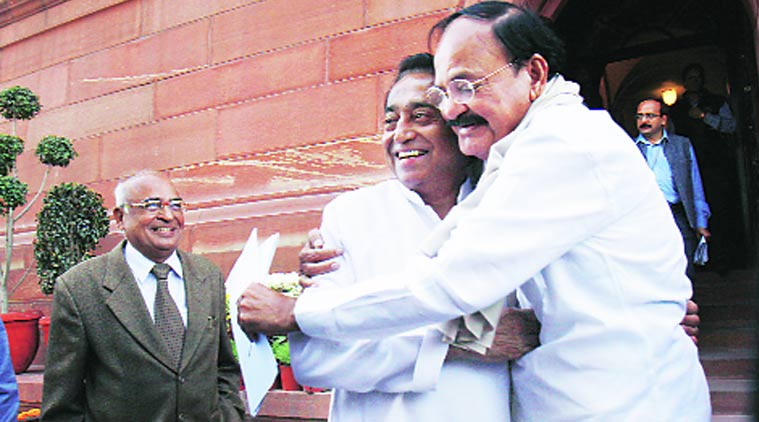 Venkaiah Naidu with the Congress’s Kamal Nath in Parliament.
Venkaiah Naidu with the Congress’s Kamal Nath in Parliament.
Promises
The government had undertaken to bring in financial reforms and a changed version of the Land Acquisition Act. Pending the passage of relevant bills, it had brought them into effect through ordinances.
Pluses
Of six ordinances, five were converted in to Acts. They include The Insurance Laws (Amendment) Bill, 2015, The Coal Mines (Special Provision) Bill, 2015 and The Mines and Minerals (Development and Regulation) Amendment Bill. A total 47 bills were passed.
Minuses
Two important bills, The Right to Fair Compensation and Transparency in Land Acquisition, Rehabilitation and Resettlement (Second Amendment) Bill 2015 and The Constitution (122nd Amendment) (GST) Bill 2014, are currently struck. The first bill has been referred to a joint parliamentary committee and the second to a Rajya Sabha select committee, primarily because the government has not been able to mobilise adequate support in the RS.
Self-rating
“Both Houses of Parliament registered a record performance in terms of the number of sittings and transaction of legislative business. We passed 47 Bills, the maximum during the last six years. The constitution amendment relating to the operationalisation of the Land Boundary Agreement with Bangladesh was unanimously passed by Parliament. The Black Money Bill was also passed. If calculated from May 2014, the Lok Sabha held 90 sittings, the Rajya Sabha 87, the highest in the last 10 years. The Government is keen on holding 100 sittings a year as recommended by the last conference of chief whips and floor leaders of legislatures in October.”
* M Venkaiah Naidu, parliamentary affairs minister
Opposition rating
“Venkaiah Naidu and his deputies, Mukhtar Abbas Naqvi and Rajiv Pratap Rudy, are doing a good job while pursuing the government agenda… Naidu is particularly very hardworking. If they are facing difficulties in the Rajya Sabha, it is only because the numbers are stacked against them. They would do well by reaching out to leaders of all parties before they come to the Rajya Sabha with any controversial business.”
* Rajeev Shukla, former MoS, parliamentary affairs
 Tourism, Culture- E-visas, Lalit Kala Akademi administrator
Tourism, Culture- E-visas, Lalit Kala Akademi administrator
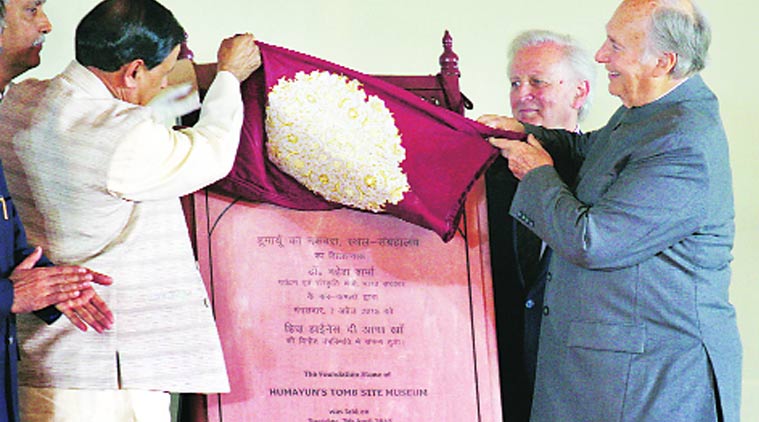 Mahesh Sharma at site of proposed museum near Humayun’s tomb.
Mahesh Sharma at site of proposed museum near Humayun’s tomb.
Promises
In tourism, to make India safer for foreign visitors especially women), liberalise visa, add new circuits, add heritage sites under better conservation plan. In culture, to fill top-level vacancies in premier organisations. In November, Dr Mahesh Sharma replaced Shripad Naik as minister in charge of both tourism and culture. The year saw the government taking control of Lalit Kala Akademi by appointing an administrator.
Pluses
India’s ranking in WEF Travel & Tourism Competitiveness Index jumped to 52 in 2015 from 65 in 2013, though it may not have been the result of just one year’s work. E-tourist visas or visas on arrival to 77 countries including China. Religious and spiritual circuits worked out or being firmed up. Incredible India helpline for tourists.
In culture, process started for filling up vacancies and making regular appointments at institutions such as National Archives. Twenty five ASI-protected heritage sites launched as “Adarsh Smarak” with improved visitor amenities. Museum reforms with digitisation of collections, “Project Mausam” for cooperation with Indian Ocean nations and revival of historical ties.
Minuses
Government could not utilise funds for its large schemes; Rs 500 crore for Swadesh Darshan was later cut to Rs 20 crore, Rs 100 crore for national pilgrimage mission to Rs 15.6 crore (this budget, the allocations are up again, to Rs 600 crore and Rs 100 crore). Crime incidents involving women tourists in various states. In culture, frequent criticism that government policies are guided by a right-wing ideology.
Self-rating
“We have increased the list of countries for e-visas and launched helplines to make tourism safe. We have embarked on strategic disinvestment of loss-making hotels. Through Swachch Bharat, we are also aiming to infuse cleanliness in all tourism centres. Our focus is also to bring up so far unchartered areas like circuits in the Northeast to the country’s tourism map. In culture, our efforts are to highlight India’s rich heritage to the world as well as to the young generation in the country. We have brought in transparency in appointments.”
* Mahesh Sharma, Tourism and Culture Minister
Opposition rating
“We have not seen any new initiative. They are talking about e-visas. That was started by us… See what they have done to Lalit Kala Akademi. They have taken it over. They have changed the director general of National Museum overnight… The only agenda of this government is saffronisation.
* Kumari Selja, former tourism and culture minister
 Urban development- Centerpiece Swachch Bharat
Urban development- Centerpiece Swachch Bharat
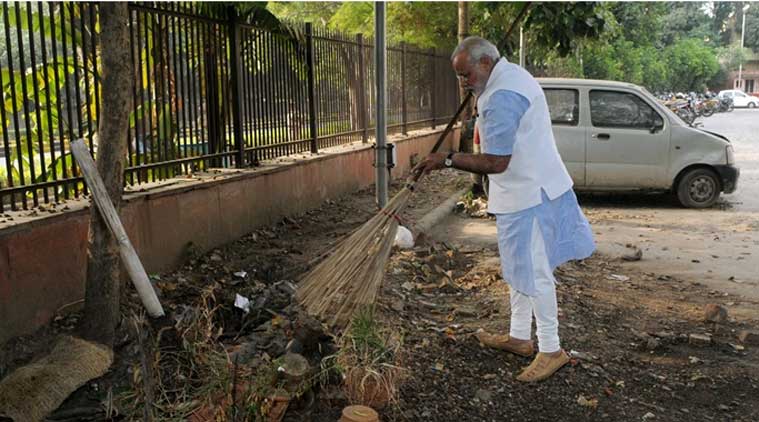 Narendra Modi
Narendra Modi
Promises
100 smart cities, Housing for All by 2022, and Swachch Bharat mission.
Pluses
Swachch Bharat, which kicked off last year, received around Rs 859 crore last year and Rs 1,000 crore this year. The scheme aims at building 1.04 crore toilets in individual households and 5.08 lakh public toilets. Ahmedabad Metro project sanctioned during the year.
Minuses
Housing for All yet to take off; names for 100 smart cities not yet finalised.
Self-rating
“Centre is committed to spending about Rs lakh crore during the next five to six years as against only Rs 36,000 crore during nine years of JNNURM. Political leadership at all levels has been sensitised to urban challenges. States are being given the much-needed freedom in design and implementation of urban initiatives to achieve intended targets. A new beginning is being made in the crucial urban sector since management of urbanisation is the most formidable challenge for India during this century.”
* M Venkaiah Naidu, Urban Development Minister
Opposition rating
“The worst thing they have done is that they have amended the Real Estate Regulatory Bill which we introduced in 2013. It was intended to be pro-buyer and protect the interests of buyers. They have converted it into pro-builder. They have destroyed the confidence of home buyers. There are no new initiatives or new measures; there is talk of only smart cities but there is no concrete or real plan to achieve that. They have not done anything beyond rhetoric.
* Ajay Maken, former Urban Development Minister
Apr 27: Latest News
- 01
- 02
- 03
- 04
- 05

















